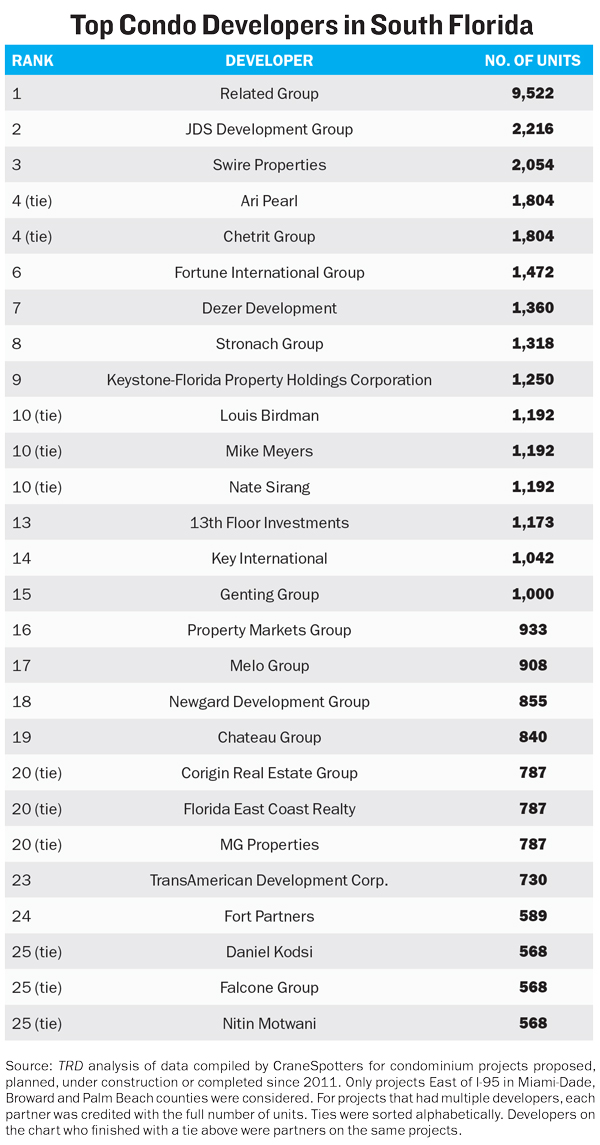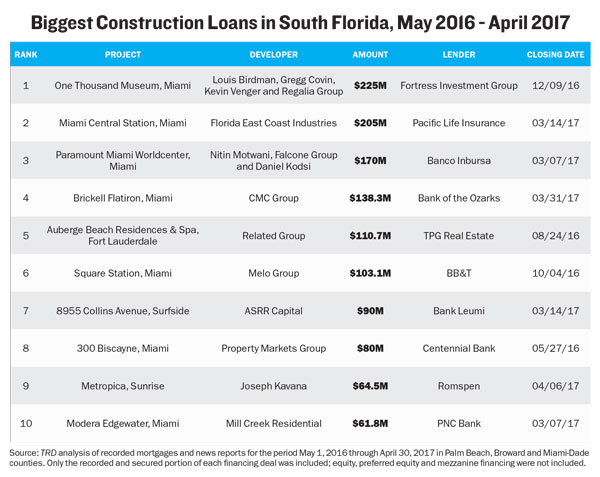After a dismal 2016, condo developers were ready to put the year behind them. The election, the strong dollar, political instability in key Latin American markets — it all sounded like a broken record.
To make matters worse, the first quarter of 2017, which the industry had hoped would prove a turning point, instead revealed an accelerated slowdown.
South Florida’s condo developers are increasingly holding off on launch dates, extending timelines and even canceling projects. But these head honchos of real estate are not sitting idly by. The region’s top developers are shifting their attention from condos to multifamily and commercial development.
That means recent announcements haven’t been as sexy as those earlier in the cycle, with constant news of massive towers with luxury amenities and eye-popping price tags; instead, a steady stream of updates features a mix of projects more attuned to the current market.
In June, the Verzasca Group announced plans to build a luxury apartment tower on an Edgewater site originally intended for condos.
The Melo Group is also focusing on rental buildings — nine of its 12 projects this cycle are multifamily.
Property Markets Group has yet to make progress on the condo component of its 300 Biscayne Boulevard site in downtown Miami, but construction is moving quickly for its Vice apartment tower on the same property.
Miami-based Terra Group has ramped up its commercial development in Coconut Grove, Pembroke Pines, Doral and other suburban neighborhoods while laying off any new condo buildings.
And even condo king Jorge Pérez’s Related Group is moving fast on non-condo fronts, including affordable housing, mixed-use projects, rentals and more. As condo sales continued to slow this year, Related is breaking ground on two Wynwood rental projects, recently completed CityPlace Doral and is in talks with the city of Coral Gables for a massive mixed-use project that would be a public/private partnership.
Related has more than 9,500 condo units in the pipeline — proposed, planned, under construction or completed — since this cycle began in 2011. The firm leads The Real Deal’s ranking of the top 25 condo developers by units by more than four times the runner-up, JDS Development Group.
But the developer is feeling the squeeze. Related launched Auberge Residences & Spa Miami in April 2016, just as the market was starting to slow down, unveiling its multimillion-dollar sales center with a bang. The firm spent more than $2 million on building out the 3,000-square-foot space with a model kitchen and bath and a scale model of the planned 60-story tower, and brought in Botero’s “Woman on a Horse” sculpture to the outdoor garden area.
But there were early signs of trouble.
During the April launch party, Related told TRD reservations were at about 20 percent, or 58 units, of the 290-unit tower. But that percentage fell by the second quarter to 15 percent, according to a preconstruction report. Meanwhile, the firm had five sales agents dedicated to Auberge and costs for marketing, administration, events and staffing.
As spring became summer, the sales numbers weren’t getting much better. In August, a lease offer for at least one of the existing building’s tenants no longer included a development clause, which meant Related was delaying construction until at least the end of 2018, more than a year after groundbreaking was expected.
After several more weekly sales meetings where agents weren’t hitting their goals, the developer finally decided to pull the plug. By December, Related had returned buyers’ deposits, shut down the sales center and canceled the project.
“It [would have been] better to not have launched it,” an unnamed source close to the project said. “When a project that big doesn’t do well, it does sent a message to the market.” Auberge will be relaunched at a later date, executives told TRD.
Steve Patterson, president and CEO of Related Development, said that while Related is “certainly still selling condominiums,” the idea behind expanding other divisions “was to not be so dependent on condominiums.”

Edgardo DeFortuna
However, for New York-based JDS, which came in at No. 2 with more than 2,200 units, condos are still the primary focus, though they also have multifamily projects in the works. The developer partnered with Property Markets Group, the Chetrit Group and Ari Pearl on a number of projects. Chetrit and Pearl are working with JDS on a $1 billion mixed-use development along the Miami River that will have 1,678 residential units, 330 hotel rooms, 266,000 square feet of retail and office space and more than 2,000 parking spaces.
The five-phase complex has been in the works since at least 2014 and secured city approvals a year later. The first phase will include a 56-story building with a 207-room hotel, 334 condos, a parking garage and 42,100 square feet of retail space. Condo sales were set to launch last summer with Fortune International Group, (ranked No. 6) but the development team has remained quiet, except for the news that they had secured a $49 million predevelopment loan in the fall.
Michael Stern, the CEO of JDS, said the company plans to break ground on the first tower in the next three to six months. The first phase will cost about $200 million. “Sales have definitely slowed down, and we’re aware of that. Miami is a market that has short-term memory,” Stern said. “We’ll start building in anticipation of the next cycle.”
He also plans to break ground next quarter on Monad Terrace, a luxury boutique condo project in South Beach, regardless of where sales stand. In late May, the project’s lender filed a foreclosure suit on the acquisition loan for Monad’s land assemblage. A spokesperson for JDS said the developer plans to close on a new construction loan soon and that the suit is “entirely without merit.”
The developer also owns land in Wynwood and in Fort Lauderdale that will be developed into multifamily projects, but Stern said he’s focused on Monad Terrace and the Miami River project.
Chetrit and Pearl, who partner on their South Florida projects, tied for fourth place in TRD’s ranking, with about 1,800 units planned for the river and in Miami Beach. (Developers who worked together on projects were each awarded the full unit count in the ranking.) Others on the list include the Stronach Group, which owns the 250-acre Gulfstream Park in Hallandale Beach, Keystone-Florida Property Holdings (the owner of the Galleria Mall) and the group of investors who plan to develop land surrounding the Diplomat Golf & Tennis Club, which is also in Hallandale.
“Overall, it’s real simple to understand where we are in the real estate cycle,” said Peter Zalewski, a real estate consultant and founder of Condo Vultures and CraneSpotters. “If you’re south of Fort Lauderdale-Hollywood International Airport, the music stopped. If you’re a developer standing on land, chances are you’re not going anywhere for three to four years.”
 North of Fort Lauderdale, Zalewski expects momentum to continue for another year or two. Cycles last about five to 10 years in South Florida, which means some projects won’t get built until the next cycle.
North of Fort Lauderdale, Zalewski expects momentum to continue for another year or two. Cycles last about five to 10 years in South Florida, which means some projects won’t get built until the next cycle.
Most developers declined to provide official launch dates or construction timelines for projects not yet out of the ground.
“It’s a very challenging time,” Zalewski said. He said the “Trump effect,” with its anti-immigrant vibe, is adding to that. “Trump is a black swan. It might be a one-time occurrence, or it could be here for eight years. If you’re a developer sitting on property or land in Dade County, and you want to send brokers to Latin America to peddle condo units, chances are you won’t get the same reception today that you would get in 2011 and 2012.
“That’s critical, because foreign nationals really like Dade County,” Zalewski added. “How ironic is it that a real estate developer is basically killing the Miami real estate market?”
But Fortune International Group President Edgardo Defortuna said the impact of the election on condo sales has been wiped out, and that if anything, buyers are “somewhat positively encouraged” by the president’s proposed tax plan. However, he did concede that launching a project now would be “somewhat more difficult” than two or three years ago.
Fortune (No. 6) and the Chateau Group (No. 19), which are developing the Ritz-Carlton Residences Sunny Isles Beach, also own a beachfront piece of land on 188th Street and Collins Avenue. There they plan to build a two-tower, 56-story complex with condos, office and retail space and a restaurant.
The developers are working on the design and building a sales center but have “no specific timeline” and aren’t in a rush, Defortuna said. They could launch sales for the project, tentatively called Playa Varadero, as early as the beginning of next year.
“We’re working on acquiring additional land, buying condo units for buyouts. We’re still far away from acquiring all the units,” he said, declining to say where.

Carlos Melo
Most developers were relatively unfazed by issues like Zika and a rising sea level. It’s foreign economies and currencies that are the cause of slower sales, Defortuna said. “From a [tourism] point of view, Zika was somewhat of an issue. In Latin America, Zika is all over the place. They’re used to it already.”
Carlos and Martin Melo of the Melo Group said they have no plans to launch more projects right now. The developers plan on delivering Aria on the Bay, a 648-unit tower in Miami, early next year. It’s about 80 percent presold, they said.
“In new development, you never know if you’re going to be successful, how long it’s going to take to reach the units you need to move forward,” Martin Melo said. “I think now we have to play it safe [and] introduce to the buyers those buildings that are a reality.”
In May, the Melos said they were still selling about 10 units a month. “The market is okay. If we do more, we create the problem. The demand is there, but the oversupply is the problem,” he added.
Melo ranked as the 17th biggest developer, with three projects and just over 900 condo units. But when you add rentals to the mix, it has 12 projects and nearly 4,200 units in the pipeline this cycle, illustrating the company’s shift toward multifamily development.
For Swire Properties, the third-largest condo developer, with just over 2,000 units, sales at its Reach and Rise condo towers have slowly inched higher over the past eight months. As of May, Reach is 92 percent sold and Rise is about 48 percent sold, said Kieran Bowers, head of U.S. operations for Swire, a Hong Kong-based firm. That’s up slightly from 90 percent and 45 percent, respectively, in September.
Both 390-unit towers are part of Swire’s Brickell City Centre, a more than $1 billion mixed-use development with retail, hotel and office components. The first phase was completed in November, and the next up will likely be One Brickell City Centre. “At the moment, we’re looking at various options. In the next two to three years, we’ll look to our next project, One Brickell City Centre and maybe something else,” Bowers said, calling the supertall tower the “vertically stacked equivalent” of Brickell City Centre.
Previously proposed plans for One Brickell City Centre include retail, office space, condos and an ultrahigh luxury hotel. Bowers declined to provide a specific timeline and said that the approved plans for the project are still in need of significant design work. Swire also owns land in Fort Lauderdale near All Aboard Florida’s station, but he declined to comment further on plans for that site.
Many developers included in TRD’s ranking declined to say exactly when they plan to launch new projects. “It’s always going to be very difficult to time the market perfectly,” Bowers said, adding that Swire wants to make sure its existing investment is performing well “before we invest another billion dollars.” Now he’s focused on ways to build momentum and create financing options, particularly for foreign buyers.
Generally speaking, developers aren’t cutting preconstruction prices — at least not officially. And when the time comes to deliver buildings and close units, Zalewski said, pricing is negotiated behind closed doors, and buyers sign confidentiality agreements.
“It’s a very troubling time for developers,” Zalewski said. “Will they sit on the dirt and be patient? And if not, what direction will they go in?”
—Harunobu Coryne provided research for this article
Editor’s note: An earlier version of this story incorrectly ranked Fortune International Group at #17. The firm contact TRD with updated numbers and Fortune is #6 on the list of top developers with 1,472 units.

